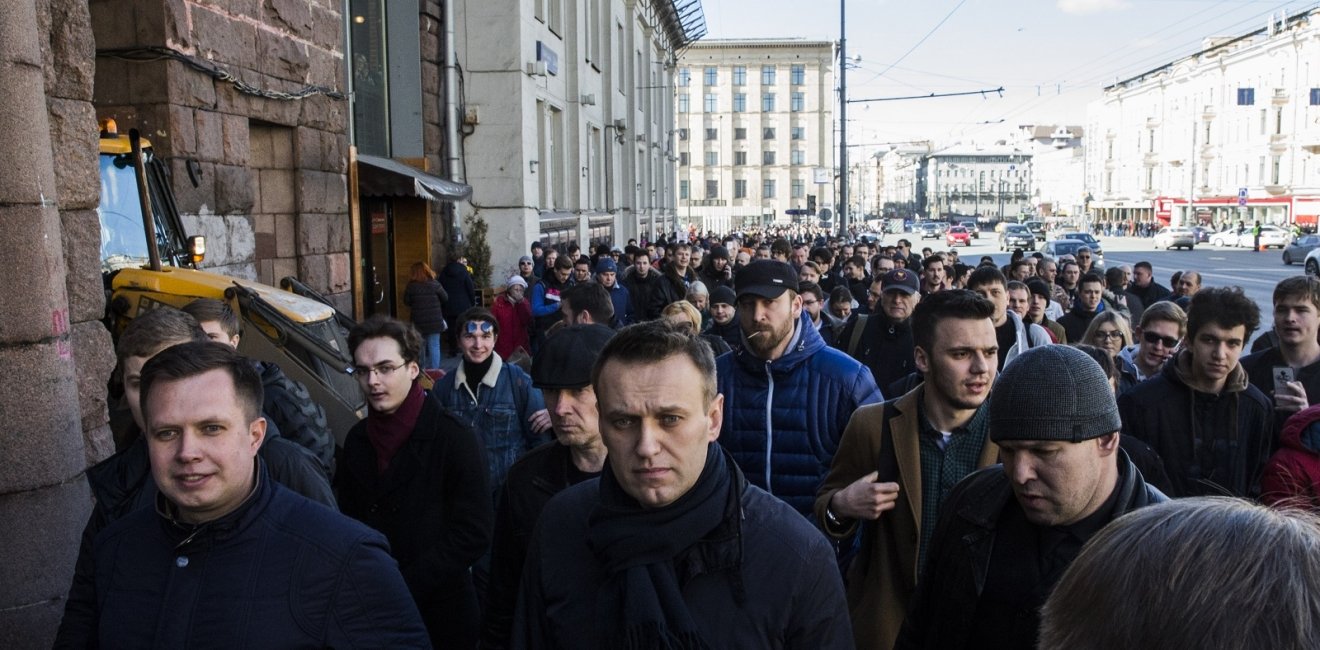
A blog of the Kennan Institute
One year after Alexei Navalny’s death, the Russian opposition in exile is in deep crisis. Many in the democratic movement are engaged in painful soul-searching. Is his legacy now wasted in fruitless internal disputes? What should those who remember him do to safeguard his memory and his mission? What should those who want to continue Navalny’s fight for a better Russia do next? As a scholar of memory, I have a particular way of interpreting Navalny’s message: Navalny, a remarkably gifted political leader, understood the power of historical memory and the role it can play in Russia’s struggle for democracy.
Much has been written about Vladimir Putin’s manipulation of historical memory for political ends. Indeed, the Kremlin’s skillful weaponization of the glory of the Great Patriotic War (World War II) and the trauma of the 1990s has played no small part in building and maintaining the stability of Russia’s authoritarianism. In essence, exploiting these two core Russian memories is what make Putin’s ideology work.
Putin’s message behind venerating the Great Patriotic War is that a strong state is essential to collective Russian security—and individual Russians must not question their state even if and when it fails to enhance their own well-being. Putin’s lesson from the chaos and economic collapse of the 1990s is that political change (let alone revolutionary change) is dangerous and undesirable.
While the ideological messaging from these memories is clearly self-serving for the Putin government, these memories strongly resonate across all of Russian society. Yet very few Russian democrats have recognized this. In failing to acknowledge the real-life experiences of millions of Russians behind these memories, they alienate many if not most Russian citizens. This dynamic became evident when debates erupted around the documentary miniseries “Traitors.”
The miniseries premiered on April 16, 2024, on the Anti-Corruption Foundation (FBK) YouTube channel, a nonprofit founded by Navalny in 2011. Like other FBK films, “Traitors” investigated corruption among Russia’s political elite. Surprisingly for Navalny’s team, however, this video did not focus on Vladimir Putin’s cronies, but instead focused on the abuses of Russia’s first president, Boris Yeltsin, and his inner circle. Despite its subject, the message of “Traitors” concerned Russia’s future rather than its past. In tracing the root causes of Russia’s failed democratic transition to the massive corruption of the Yeltsin era, the authors of the video drew a direct line from the corruption of the 1990s to Putin’s authoritarianism of today. In doing so, they invoked the widely held perception of the 1990s as a troubled period in Russia’s recent history and tied the rise of Putin to that legacy. In doing so, they effectively countered one of the Kremlin’s favorite tactics: lambasting the 1990s while portraying Putin as Russia’s savior from the chaos and weakness of the 1990s.
The film calls on Russians to re-examine the mistakes of Russia’s post-Soviet transition and warns against missing Russia’s next chance at democracy—just as the reformers of the 1990s missed theirs. The take-away message the film’s authors hope to convey is that today’s pro-democratic opposition must learn from its past failures. Importantly, in this regard, they followed what they saw as Navalny’s political testament: an essay titled “My Fear and Loathing,” which he wrote in prison.
The miniseries sparked controversy across the various factions of the Russian pro-democratic opposition. Critics of “Traitors” included politicians and journalists, political pundits and businessmen, bloggers and philanthropists, and writers. Some argued that “Traitors” presented an overly simplistic—and thus distorted—view of both the 1990s and Boris Yeltsin. Others equated the miniseries with Kremlin propaganda, both in terms of style (dogmatic and dismissive of dialogue) and content (a wholesale condemnation of the 1990s). Still others contended that the miniseries reflected nothing but a petty internal power struggle within the pro-democratic opposition.
Intentionally or not, the miniseries—and Navalny’s prison essay that inspired it—fit within the broad theoretical (and practical) framework of reckoning with a nation’s past. This approach holds that a nation’s path to democracy requires confronting its authoritarian history. Indeed, autocracies leave in their wake difficult legacies of political repression and violent conflict. Unless these are addressed, proponents of “working through the past” argue, democratization is doomed to fail. In other words, the honest memory of an authoritarian past serves as a crucial step toward building a democratic future.
Despite the mixed record of “working through the past” in Eastern Europe following the disintegration of the Soviet Union, this approach remains widely popular with the Russian pro-democratic movement. In seeking to explain why Russia’s democratic transition went awry, many point to its failure to reckon with the Soviet past. Should another opportunity for democratization arise, they argue, this mistake must be corrected. In the wake of Russia’s invasion of Ukraine, this idea gained particular prominence within the opposition. The debates surrounding “Traitors” raised the idea again, but in a manner that discomforts many in the democratic Russian opposition.
Liberal Russian critics claimed the miniseries got it all wrong. The failure to build democracy in Russia, they argued, was not because of corruption among Yeltsin and his entourage, but rather because of their unwillingness to confront the country’s totalitarian past. The Yeltsin government failed to dismantle the KGB, hold its members accountable for past abuses, and take symbolic but important steps such as removing Lenin from the Mausoleum. It was this kind of failure—not corruption—that paved the way for Putin’s authoritarianism. Both the authors of “Traitors” and its critics embrace the idea of learning from the past. The real disagreement is over which version of the past to learn from.
As the debate surrounding “Traitors” demonstrates, many of those within the pro-democratic movement that are eager to reckon with the horrors of Russia’s Soviet past proved unable to confront the excesses of the 1990s. As a result, they are missing yet another opportunity to connect and build legitimacy with Russian society. In general, Russians have less dread of late-Soviet dreary stability than the painful shocks and chaos of the 1990s. Most importantly, they overlooked the crux of Navalny’s strategy—to harness the power of this painful memory, which Putin has successfully weaponized, against Putin himself.
Even today, many within the Russian pro-democratic movement reject Navalny’s harsh criticism of the 1990s. Rather than uniting the opposition around the common goal of resisting Putin, they argue, the FBK’s denunciation of the 1990s only deepens divisions within the opposition. And indeed, it does—but it doesn’t have to. It is not too late for critics in the opposition to reassess their stance, and come to embrace Navalny’s final message: To transform the memory of the 1990s into a vehicle that delivers a message on the value of democracy that actually resonates with Russian society itself.
The opinions expressed in this article are those solely of the author and do not reflect the views of the Kennan Institute.
Author


Kennan Institute
After more than 50 years as a vital part of the Wilson Center legacy, the Kennan Institute has become an independent think tank. You can find the current website for the Kennan Institute at kennaninstitute.org. Please look for future announcements about partnership activities between the Wilson Center and the Kennan Institute at Wilson Center Press Room. The Kennan Institute is the premier US center for advanced research on Eurasia and the oldest and largest regional program at the Woodrow Wilson International Center for Scholars. The Kennan Institute is committed to improving American understanding of Russia, Ukraine, Central Asia, the South Caucasus, and the surrounding region through research and exchange. Read more

Explore More in The Russia File
Browse The Russia File
Chechnya as a Model of Modern Russia

Russia’s Indigenous Communities and the War in Ukraine

Gas and Power in a Changing US–Russia Relationship

